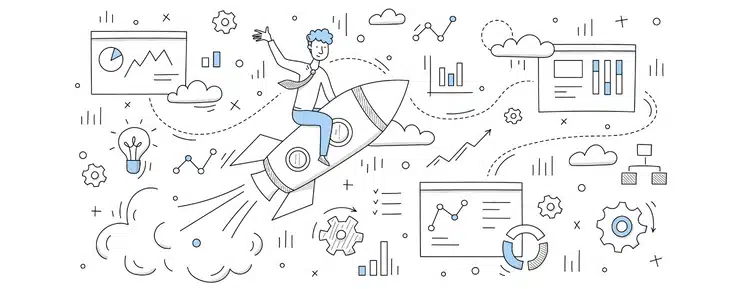Data Analyst Salary: Key Things You Must Know
Introduction
There is no question that salary is one of the most important factors while choosing a career or even an offer that suits you most! Let’s spend a few minutes then to explore the average Data Analyst Salary (India) so it helps you make an informed decision.
If you think about what are some of the most important considerations for choosing a job as a Data Analyst, you will inevitably consider what salary this job can draw. In other words, what is your earning potential over tenure in this job family? Some questions you may want to consider as you weigh your choice are will the salary be sufficient for me and my family to lead a healthy life, does it match my expectations, is the salary bracket personally fulfilling, and does it meet my expectation of where I want to be financial.
Data Analyst Salary
Data Analysis has indeed become a hot job not just in India, but also around the world. A Data Analyst salary in India is significantly higher than in most other professions. For example, the starting salary of a software professional in India currently is 261k in contrast with 341k for a data analyst starting salary. Surprising? Not really!
If you look at the amount of data that is generated every second of the day across the globe, you can easily estimate how critical it is to be able to make sense of this data that is floating around. To give you an idea, across the world, people spend an average of 188 million emails, watch 4.5 million YouTube videos, and exchange 18.1 million text messages each minute. We generate over 2.5 quintillion bytes of data each day. Therefore, people who can observe this data and provide insights that can help companies make data-driven decisions faster and in a more agile manner will be a skill that is in high demand.
A data analyst job salary is dependent on many factors similar to any other job family including experience, industry, location, company, skills, etc. If you have the required skill sets now and are ready to invest in yourself to learn and update your skills continually, your career as a Data Analyst is expected to keep growing. This is especially true when we think that a data analyst’s salary in India is heavily influenced by how skilled and updated an employee is.
We have often heard questions like “What is the average salary of a data analyst?” or “What is a data analyst’s starting salary?” or even “What is the senior data analyst’s salary that I can benchmark against?” All these questions allude to the fact that there is no standard bar or regulatory fences around which these salaries are offered. Typically, a successful offer is often based on how much you know about the job family and your negotiation skills that leverage the knowledge you have about the market. So here are some insights that can definitely inform your choice:
In India, a data analyst typically makes between ₹200k – ₹949k while the average salary is ₹427k. Also, one can expect an annual bonus of around ₹10k – ₹187k and commissions of around ₹3k – ₹150k. Now, remember, these are ballpark figures only. A survey of data analyst salaries across popular employers showed companies like Accenture, Tata Consultancy Services, Ernst & Young pay around ₹500k while others like Capgemini and Genpact pay around ₹350k.
78% of the data analytics professionals in India are in the salary bracket capped at 6 Lakhs at their entry-level, but since there has been a rise in the number of freshers in Data Analysis in India, this is an excellent indicator of the growing industry.
Let us look at Years of Experience and its Impact on Salary
Its common knowledge that the higher your experience, your salary potential also increases significantly. For individuals who have spent 20 years in this job, a family may expect to earn 2 million while employees with 5-9 years’ experience can expect to draw about 672k. A Senior Data Analyst Salary in India is ₹1,750,000 with an additional bonus of ₹127,000, i.e., a 310% higher salary than the median. In contrast, the average Data analyst salary for fresher’s in India is ₹341,413 with about ₹39,120 in bonus and an added commission and profit-sharing of approximately ₹37,000.
While the data analyst salary in 2020 can increase steadily over the first five to 10 years, afterward it would prove to be increasingly challenging to obtain raises without working on broadening your skills and updating yourself continuously. Also, remember, different skills in different stages of your data analyst career can affect your data analyst salary as well. The most important mantra in this field is to avoid redundancy and the best way to do that is to be a curious and constant learner.
The most popular hard skills that positively affect data analyst salaries are Data Modelling, Tableau Software, Python, R, Structured Query Language or SQL, Statistical analysis, and Database management and reporting. Also, soft skills such as critical thinking will hold you in great stead as well. Skills such as Microsoft Excel or Microsoft office are not in high demand now and see significantly lower value in terms of salary worth. As a case in point, the average salary for a Data Analyst with Data Modeling skills in India typically gets 37% higher salaries than an analyst with any other skills.
In terms of location, the top-paying cities for employees with Data Analyst in their job title are India’s tech hubs of Bangalore (18% higher than the national average) and Pune (8% higher) while locations such as Mumbai (6% lower), Delhi (5% lower) and Chennai (3% lower) are relatively less promising for Data Analyst roles. To be fair, we must also look at the cost of living in each of these cities to assess if this would impact your quality of life significantly.
Conclusion
In conclusion, the demand for data analysts seems to be on an exponential rise both in India and across the world spurred by the ever-increasing amount of data online and the competitive market. With large volumes of data constantly being created by businesses and the limited availability of ways to extract it and interpret it to gain useful insights, companies see a competitive advantage from it. This demand will only increase as our dependency on data increases worldwide.
In our opinion, what will count towards your advantage is if you invest time in expanding your skills, learn from industry experts, and know the industry best practices and latest trends. This would further establish your credibility while applying for your dream job. We hope that this article will help you step into your data analytics career and we hope that you find fulfillment in being a part of an envious talent pool.
To solidify Data Analysis & Management concepts, you should check out our Integrated Program In Business Analytics, in collaboration with IIM Indore. This 10-month online live program is easy to understand and designed by highly experienced experts to help learners become Future Leaders and transition into leadership roles.
Also, Read
How To Become A Data Analyst in 2020: A Comprehensive 8 Step Guide













